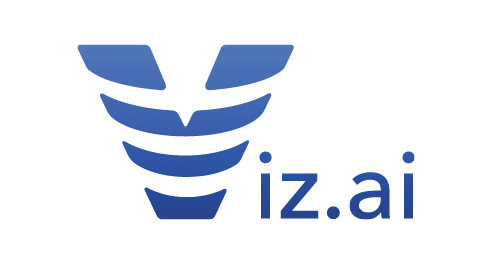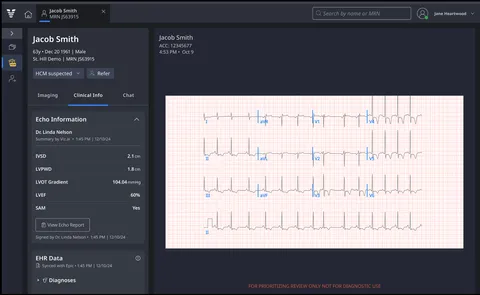
Viz.ai AI-Powered Solution Identifies Hypertrophic Cardiomyopathy Earlier, Enhancing Clinical Care
Viz.ai, a leading company in AI-powered disease detection and intelligent care coordination, has announced compelling new clinical data demonstrating the effectiveness of its Viz HCM module in detecting hypertrophic cardiomyopathy (HCM) at an earlier stage. The findings, derived from four distinct studies, will be presented at the upcoming American College of Cardiology’s (ACC) Annual Scientific Session & Expo 2025. These studies highlight the real-world clinical impact of AI-driven ECG analysis, showing that earlier detection and triage of HCM patients can improve access to timely treatment and optimize patient care.
Hypertrophic cardiomyopathy is a commonly inherited heart disease characterized by the thickening of the heart muscle, which can lead to arrhythmias, heart failure, and sudden cardiac death. Despite its prevalence, HCM often goes undiagnosed for years due to its variable presentation and subtle early signs. The Viz HCM module, developed through a multi-year collaboration between Viz.ai and Bristol Myers Squibb (NYSE: BMY), is the first and only AI-based algorithm cleared by the U.S. Food and Drug Administration (FDA) for HCM detection. This groundbreaking technology is designed to streamline diagnosis and ensure more patients receive the care they need.
The Role of AI in Early Detection of HCM
Artificial intelligence has revolutionized healthcare by enabling automated analysis of medical data, allowing for faster and more precise identification of disease patterns. Viz HCM leverages AI to analyze 12-lead electrocardiograms (ECGs) across health systems, flagging suspected HCM cases and notifying cardiology care teams. By embedding this AI-driven approach into clinical workflows, Viz.ai enhances physicians’ ability to diagnose and manage HCM in its early stages, potentially preventing complications and improving patient outcomes.
Dr. Milind Desai, MD, MBA, Director of the Center for Hypertrophic Cardiomyopathy at Cleveland Clinic, expressed optimism about AI’s role in advancing HCM diagnosis. “It’s exciting to see growing real-world evidence showing how AI-enhanced ECG analysis can play a pivotal role in identifying new patients with hypertrophic cardiomyopathy. By leveraging AI as a second set of eyes, we can expand the ability to diagnose more HCM patients earlier and across diverse populations, tackling a condition that’s often challenging to detect.”

The Viz HCM module received De Novo FDA approval in August 2023, establishing a new regulatory category for cardiovascular machine learning-based notification software. This milestone highlights the software’s potential as an essential tool for healthcare professionals seeking to improve the early identification of cardiovascular conditions.
Key Clinical Findings
The four studies presented at ACC 2025 offer compelling evidence of the efficacy of Viz HCM:
- “Real-World Artificial Intelligence–Based Electrocardiographic Analysis to Diagnose Hypertrophic Cardiomyopathy”
- Conducted at Cleveland Clinic and published in JACC: Clinical Electrophysiology, this study evaluated Viz HCM’s performance in detecting HCM.
- The AI-ECG successfully identified 574 patients with HCM while also detecting 691 cases with alternative clinically relevant diagnoses.
- The findings underscore the AI’s potential for accurate disease identification and early intervention.
- “A Retrospective Assessment of Delays in HCM Diagnosis and the Potential Impact of an Artificial-Intelligence-Assisted Electrocardiogram Screening”
- This study assessed the ability of Viz HCM to predict HCM based on serial 12-lead ECGs.
- The confirmatory diagnosis was evaluated by expert clinicians at an HCM Center of Excellence.
- Findings revealed that AI could have identified HCM earlier in 155 patients, with potential diagnoses being made:
- More than 1 year earlier in 20% of cases
- More than 3 years earlier in 12.9% of cases
- More than 5 years earlier in 9.0% of cases
- More than 10 years earlier in 4.5% of cases
- This study highlights the potential for AI-assisted ECG screening to facilitate earlier intervention and improve patient outcomes.
- “A Multicenter, Prospective Cohort Pilot Study on the Clinical Implementation and Utilization of an AI-Based ECG Tool for HCM Detection and Care Coordination”
- This prospective study evaluated the integration of Viz HCM into clinical workflows.
- Among 145,848 screened patients, 3% were flagged for suspected HCM and referred to specialists.
- A total of 217 patients met study criteria and were enrolled, representing a diverse patient population:
- 23% Black
- 9.2% Asian
- 12.4% Hispanic or Latino
- The AI-assisted workflow successfully identified 17 new HCM patients (8 inpatient and 9 outpatient diagnoses).
- These findings demonstrate that AI-driven ECG screening can be seamlessly implemented in diverse healthcare settings, facilitating improved patient identification and care coordination.
- “Machine-Learning Algorithm for the Detection of Hypertrophic Cardiomyopathy from Standard Electrocardiogram”
- This study assessed the sensitivity and specificity of the Viz HCM algorithm in identifying HCM confirmed by cardiac MRI.
- The AI model successfully detected 87 out of 156 patients with confirmed HCM.
- The reported performance metrics included:
- Sensitivity: 56%
- Specificity: 100%
- Positive Predictive Value: 100%
- These results further validate the accuracy of Viz HCM in recognizing HCM from standard ECGs.
Transforming Patient Care Through AI Integration
By embedding AI-powered ECG analysis within clinical workflows, Viz.ai is redefining how cardiovascular diseases like HCM are identified and managed. Dr. Michael Ayers, MD, Co-Director of the HCM Center of Excellence at the University of Virginia, emphasized the importance of early detection. “The findings from our study highlight the potential of AI-based ECG analysis to identify hypertrophic cardiomyopathy well before a clinical diagnosis is made. By detecting HCM months or even years earlier, this technology could allow for earlier intervention, potentially improving patient outcomes and altering the course of the disease.”
Molly Madziva Taitt, Ph.D., VP of Global Clinical Affairs at Viz.ai, reinforced the company’s commitment to integrating AI into clinical practice. “At Viz.ai, we are dedicated to ensuring the reliable detection and timely triage of underdiagnosed conditions like HCM, ultimately enhancing care and outcomes for more patients. The robust clinical evidence presented at ACC underscores the strong and consistent performance of the Viz HCM module as a practical tool for efficiently triaging patients for clinical evaluation with the right specialist at the right time.”
As AI continues to shape the future of healthcare, tools like Viz HCM are proving invaluable in improving disease detection, streamlining care coordination, and ultimately saving lives. With its FDA-cleared technology and growing body of clinical evidence, Viz.ai is leading the way in transforming the early diagnosis and management of hypertrophic cardiomyopathy.





